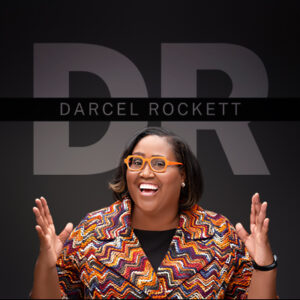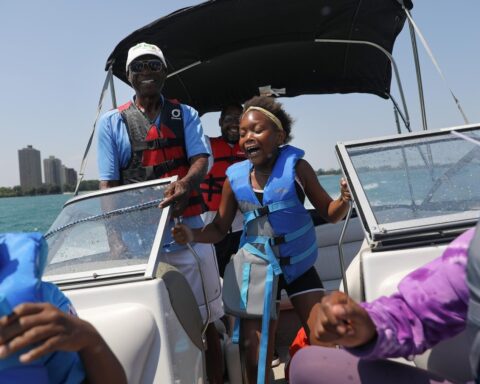Tuesday nights at Chicago skate parks are long, but exhilarating for the members of froSkate. It’s boisterously energetic, but in a mellow, “do you” kind of way. Hugs and smiles go around equally to newcomers and regulars about as often as their wheels, which find every nook and cranny the concrete has to offer.
From 7 to 11 p.m., they grind, ride, roll, fall and conquer a scene traditionally dominated by men. Some are just starting out, others are more seasoned — ages range from teens to 30s — but nearly all are women of color and members of the LGBTQ community.
“Support is everything,” said Chatham resident Mia Ingram, 22. “Representation is real. It’s like a wow factor seeing a black woman with a skateboard.”
Founded in April, with the first official meet-up in late May, froSkaters gather throughout the city — at Roberto Clemente High School, Logan Boulevard Skate Park and Wilson Skate Park — to practice the sport and talk about life’s ups and downs while trying to stay upright. FroSkate is for people who have never felt represented in skateboarding.
Women from as far as Indiana, even some visiting parents for the summer, attempt 360 flips, manuals, pop shuv-its, and ollies (in which the skater kicks the tail of the board down while jumping to pop it into the air). The women rock Vans sneakers, nose rings and raise a rowdy cheer in a show of solidarity when someone has their first fall, joining forces to pursue a sport they’ve been interested in but intimidated to try.
“You show up to a skate park to skate and it’s mainly white-dominated,” said organizer Karlie Thornton, 22. “There are some people of color that can be there, but it’s definitely intimidating. Not that skate parks are exclusive, but just the vibe you get when you pull up and you don’t see anybody that looks like you can make you feel excluded.”
Thornton, a St. Louis native now living in Logan Square, wanted to learn how to skate, and when friends Maya Green, 22, and Brianna Beckham, 22, chimed in with interest, froSkate came to fruition.
Word of mouth slowly grew the group organically, but a viral tweet from Green in June — a photo of 13 women at Logan Boulevard Skate Park — pushed numbers to the dozens. “Me & two of my friends started a skate group of women of color in Chicago and I swear to god this is some of the most fun ive ever had” the tweet read, garnering 5,000 retweets and more than 22,000 likes.
Now, anywhere from 30 to 50 people show up on any given Tuesday night, and Thornton said women of color or gender nonconforming people of color can’t walk around town holding skateboards without someone asking if they’re part of “that black girl skate crew.”
“We’re here to show that girls can do what they want. It’s crazy just to be saying that in 2019,” Beckham, froSkate organizer, said.
There’s no cost to join, just show up with a board and be welcomed into the fold. Thornton often brings extra skateboards for first-timers, so they can experience the joy and camaraderie with others in the moment, so no one is left looking on from the sidelines.
When Ingram first went to Logan Boulevard Skate Park, at 2430 W. Logan Blvd., she peeked in, didn’t see anyone who looked like her, and went home. That was a non-froSkate day. Then she found the group through their viral tweet.
Fast-forward a few weeks to a warm summer night at the Wilson Skate Park parking lot along Lake Shore Drive. She practices feeling comfortable on her board, smiling ear to ear as she descends a small ramp without falling or holding a rail for support. Cheers and claps crescendo in that corner of the park.
Iris Simone Haastrup-Sanders, 19, picked up her skateboard in early June and has practiced five to seven hours a week since, in addition to froSkate meetups, to make as much progress as she can before returning to school on the East Coast.
“I thought I was alone, so when I found that there was an actual event to go to, I was so excited,” she said. “It was so much fun skating with people who are on the same level as you. I thought it was the best thing in the world.”
Because of the rapid growth, froSkate expanded its programming to offer movie nights, group trips (like the recent one to New York City), and has plans to add a second weekly meet-up where the group can bond through nonskate events. Think “decorate your deck” art nights, ramp building and mental health conversations — all aimed to strengthen family froSkate.
Some call it a movement, others not so much. And while the concept is rare, it’s certainly not unique. Around the world, skateboarders have launched groups, nonprofits and tours aimed at sharing the sport with a less likely following.
In Oakland, Calif., Unity brings together LGBTQ and gender-nonconforming people; Briana King‘s group Display Only touts a “Girl & Queer Skate Sesh” tour with stops in Miami, Seattle and other U.S. cities. Skate Nation in Ghana preaches inclusivity and idea sharing.
But in Chicago, it’s froSkate, and established local skaters are taking note.
“One of the last times I was at Clemente, you hear this outburst of: ‘Ahhhh!’” said Andrew Smith, an 18-year skateboarding veteran living in the city. “Not to sound sexist, but if it’s the dudes doing stuff, it’s like whatever dude, you did a kickflip, so what? But when it’s girls doing it, they’re all like ‘Yes! Awesome!’ And I think what they’re doing is way sicker than what we’re doing.”
O.J. Hays, Chicago skateboarder and artist, also applaud’s froSkate’s bold efforts. “Traditionally, there haven’t been a lot of women skaters. That’s kind of the way that it’s been. Now more than ever, there’s been a huge push in skating for women, which I think is phenomenal,” he said.
But the sisterhood is not without its naysayers. When froSkate organizer Green sent the group’s early tweet, she said the majority of comments were positive, but about 20% criticized the look of the group and their skating prowess.
“If a girl says she plays video games, guys are like, ‘When did the first Mortal Kombat come out?’ You say you like sports, guys are like, ‘How many home runs did Babe Ruth hit?’ You say you skate, and they ask you to do a 360 flip right now. Why is a woman doing something that is usually ‘for a man’ bother them so much?” Green said.
The group has also experienced some backlash about its focus on marginalized communities at the expense of white skaters. Thornton pointed to social media comments calling the group racist. But members and fans want to be clear: All are welcome.
“We simply want to encourage more women of color to join the sport, to bring better representation to the sport. No one is excluded. FroSkate is for people who have never felt represented in skateboarding,” Thornton said.
“I see my froSkate sisters more than I see my best friends. Even when we’re not skating, we’re together plotting on how we can expand and get more girls on board. It’s become this whole movement. For me, it’s more the sisterhood than anything,” said Sunny Boyd, 28, of Hyde Park. “I fail 95% of the time at doing this, but that 5% when you get it right is the craziest feeling ever, and it’s crazy to think the failing part was why I wanted to do it, but I figured that if I can accomplish this, then I can do anything.”
As the group continues to grow, Green said she doesn’t “measure success by how big it gets, but more of how much fun we have on the way and how many people it gives a bit of a home to.”
Thornton agrees, offering this advice to others looking to fill a void in their community:
“There’s a quote that I like. ‘You’re never ready, you’re only ready enough.’ You just have to understand that and throw yourself into it,” she said. “You see a need, stop doubting yourself, stop putting yourself down. Find friends around you who are passionate about the same thing and band together; figure out your friends’ strengths or weaknesses and see how together you can make something happen by combining all your strengths and talents. Just do it.”
After all, the group’s tagline is: Falling is easier when it’s with friends.







